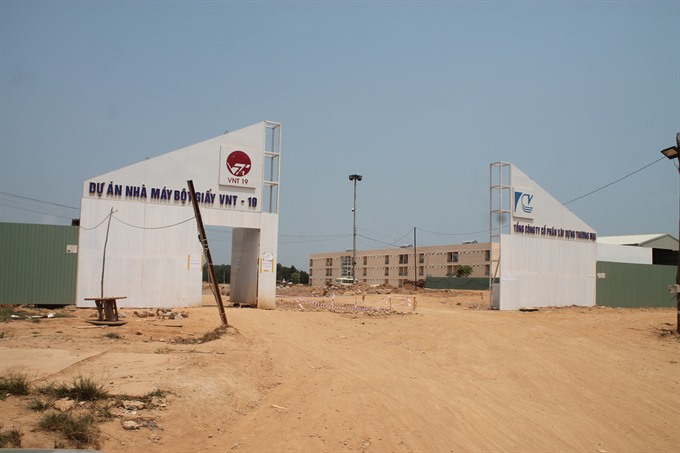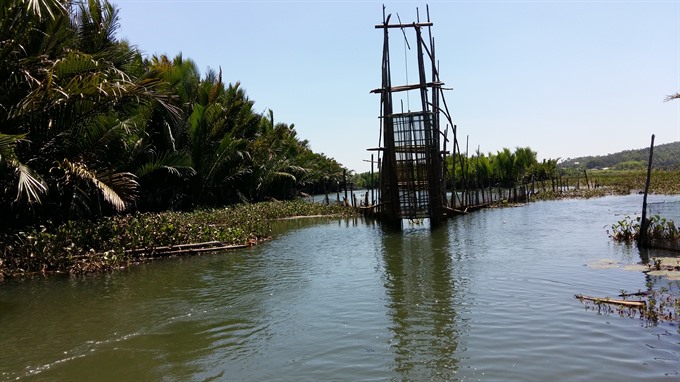 Environment
Environment

Despite the rich biodiversity embodied in a century-old nipa palm forest in provincial Bình Sơn, the province has approved the construction of a 87ha reservoir in providing water for a wood-pulp plant, VNT19, and other industrial projects in Dung Quất Economic Zone in Bình Sơn District.
 |
| A paper mill is under construction in Quảng Ngãi Province. Residents are anxious at its environmental impact. — VNS Photo Công Thành |
QUẢNG NGÃI — Despite warnings of environmental pollution and damage to rich biodiversity, a century-old nipa palm forest in Bình Sơn District, the central province of Quảng Ngãi has approved the construction of a 87ha reservoir to provide water for a wood-pulp plant, VNT19, and other industrial projects in Dung Quất Economic Zone in the district.
It is alleged that the reservoir would destroy 50ha of a 100-year-old nipa palm forest in Phước Ninh Commune, causing pollution, loss of biodiversity, and irrevocable damage to livelihoods in the community.
According to a decision signed on August 2, the provincial People’s Committee agreed to provide VNĐ13.2 billion (US$580,000) in compensation to replant nipa palms at an assigned location in the district in the next four years.
The decision also included the upgrading of the three channels that will supply water from Thạnh Nham irrigation system to the reservoir.
This means that 400 households in the area, whose lives rely on the forest for fishing and collecting nipa palm leaves would lose income and an area rich in biodiversity would disappear.
Vice chairman of the provincial People’s Committee Đặng Văn Minh said the relocation decision had been signed and it was impossible to change the decision.
He said the province and relevant agencies would strictly supervise the operation of the paper mill on the environment impact
Biologist and vice rector of Đà Nẵng’s Teachers’ Training College, Võ Văn Minh, who made the case against the plant in a petition to the provincial People’s Committee in September, said the environmental assessment of the nipa palm forest and coastal mangrove swamps had been done carelessly, neglecting the rich biodiversity.
He said none of the nine-member environment assessment association was a biodiversity researcher or biologist.
“The assessment stated that there were no endangered species living in the nipa palm forest, only small normal fish and shrimp species and birds. Some aquaculture farms were developing in the area,” Minh said.
“No detailed biodiversity studies were given during the environment assessment process," he claimed.
 |
| A corner of the threatened nipa palm forest in Bình Sơn District. — VNS Photo Công Thành |
Minh, who is head of the Environment Biological Resource Teach Research Team, said the team, in co-operation with the Centre of Biodiversity Conservation, GreenViet, a NGO, had surveyed the biodiversity of the nipa forests and mangrove swamps and found them extremely rich.
“Seventy five species of flora and fauna were found on a total 120ha of nipa palm forest. The 100-year-old forest area is also a safe shelter for 26 migrant bird and waterfowl species. Almost 90 per cent of aquatic animals and fish in the coastal area breed in the ecological system of nipa palm forest before moving to the sea,” Minh said.
Mai Văn Ban, 73, a veteran in the commune, said the forest had safely sheltered him and two army troops during the American war in 1966-72.
“The forest had provided us fish, while prevented us from bombardments and military attacks. It still creates income for local residents from fish farming and crafts in peace, and providing a green shadow with rich oxygen as well as flood and erosion prevention,” Ban said.
“We protests the destruction of the forest, they (investors) could build a reservoir at another location, not in the nipa palm forest,” he said.
Hồ Duy Diệm, a member of Việt Nam Association for River Basin and Coastal Area Protection, said the forest played an important role in environment protection and development of coastal fish and seafood species.
He said the destruction of the forest would result in mass damage for generations.
Vice chairman of Bình Phước Commune’s People’s Committee Nguyễn Vũ said the VNT19 company could ask for land clearance at paddy fields nearby for reservoir construction rather than destroy the forest.
He said the forest created a green landscape and shelter for fish, shrimps and oyster, while protecting farming land from erosion and salinity.
In a press conference last month, Chairman of VNT 19 paper mill Nguyễn Tiên Phong said work on the plant would stop if an environmental incident occurred.
He said the plant had been included in a Master Plan of Việt Nam Paper Industry in 2020-25 with total capacity of 350,000 tonnes of paper each year.
The paper plant needs 4.3 million cubic metres each year for production.
The 173ha paper mill with an investment of VNĐ10 trillion ($442 million) plans to release 73,000cu.m of waste water each day to the bay of Việt Thanh through a 5.2km pipe line.
According to latest report from the provincial Department of Agriculture and Rural Development, the province has 197ha of coastal mangrove forest, a drop of nearly 60 per cent since 2002. — VNS